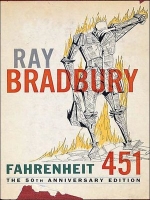I was recently stumbled an interesting page with quite a few quotes that define Science Fiction. The sources range from various famous authors that include Isaac Asimov, Frank Herbert, and Robert A. Heinlein, to unknown sources. There are a few explanations of the difference between Science Fiction and Fantasy which were quite interesting. It should be a very interesting read for any fans out there. Check it out!
What is Science Fiction?
Related Post
Fahrenheit 451 by Ray Bradbury narrated by Stephen HoyeFahrenheit 451 by Ray Bradbury narrated by Stephen Hoye

Fahrenheit 451 has been on my list to listen to for some time now. It just so happens that this turned out to be “Banned Books Week”. How serendipitous is that? I recently listened to The Martian Chronicles and immediately noticed it was the same narrator, Stephen Hoye. His voice seems to pair well with the classic nature of both of these novels. There’s an old-timey feel to it, and the tone of his voice is perfect to express the melancholy feel ever so prevalent in Fahrenheit 451.
To be honest, all I really knew about the novel was that books were burned, and that this was classic that everyone should read as a cautionary tale. There are many layers to it other than the book burning though. It’s not just about burning the books. What do they represent? Knowledge begets jealousy. Undeniably some people have more time or ambition to seek out knowledge than others. Why not control what knowledge there is to consume so everyone is equal and people are happier, right? Without books, what is left? There are still publications like comic books and magazines, but nothing of real substance. (more…)
Robots and Empire by Isaac AsimovRobots and Empire by Isaac Asimov
At this point if you have not read The Caves of Steel, The Naked Sun, and The Robots of Dawn, this review will contain plot spoilers for those novels. I highly suggest reading both of them before even reading this review.
The events in Robots and Empire take place about 200 years after The Robots of Dawn. Elijah Baley’s victory in exonerating Dr. Han Falstofe in the death of R. Jander Parnell secured his powerful position in Auroran government. Kelden Amadiro which was implicated in the death of Jander hasn’t forgotten his bitter defeat. With his support Earth was allowed to develop its colonization plans. The number of Settler worlds is increasing, and no new settlement from Spacer worlds has taken place. Actually, Solaria has severed all contact with everyone and is rumored to be empty. (more…)
The Martian by Andy Weir narrated by R.C. BrayThe Martian by Andy Weir narrated by R.C. Bray
When I was looking for what to spend some of my first Audible credits on, The Martian by Andy Weir stood out. This still ranks at the top of roughly 15 audiobooks I’ve listened to for two reasons. First, the story and writing was engaging. This was “hardest” sci-fi I’ve read so far. There is a lot of math, chemistry, physics, and botany (yes botany). I’m sure that many people would be put off by such dry and detailed descriptions, but that leads me to my second point. The performance of the narrator, R.C. Bray, was superb. He made the “hard science” interesting and entertaining. His voice strikes me as a perfect fit for the main character, Mark Watney. Do yourself a favor and listen to the 5 minute sample on Audible and judge for yourself. While the book focuses on his Watney’s mission log, R.C. Bray does voices for other characters in NASA back on Earth. The voices are OK, nothing but nothing spectacular. I can’t say there is anything wrong, but there are other narrators with a stronger skill for differing character voices. (more…)

